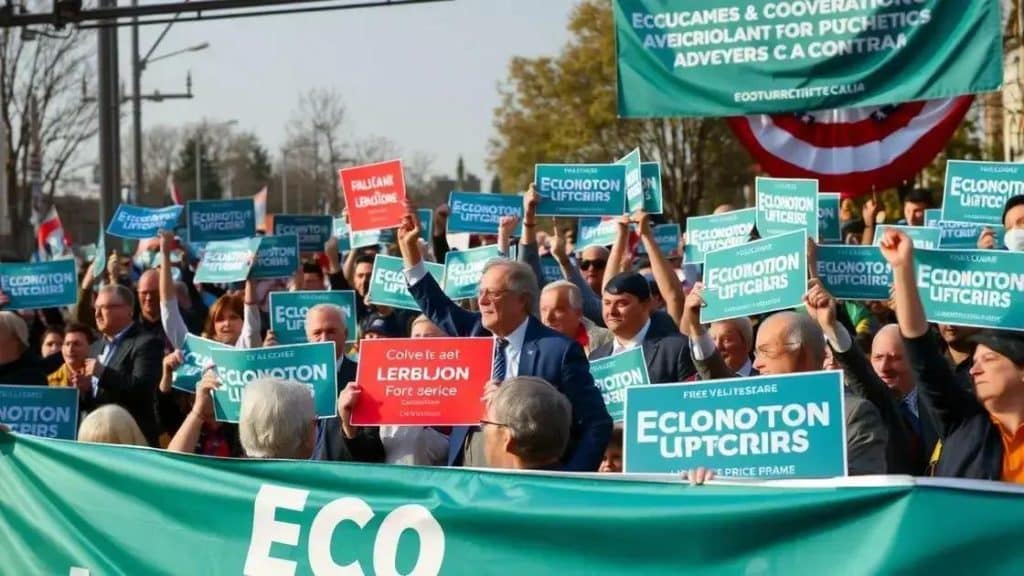Economy political campaign focus: Strategies for success

Understanding the economy’s role in political campaigns is vital, as effective communication of economic policies and analysis of voter sentiment can significantly influence election outcomes.
Economy political campaign focus is essential in today’s political landscape. How does the economy influence voters’ choices? In this article, we will delve into effective strategies to address economic concerns in political campaigns.
Understanding the economy’s role in political campaigns
Understanding the economy is crucial in political campaigns. Candidates must communicate how their policies affect the economy and, in turn, influence voters. Economic issues can resonate deeply with the public. When people are worried about jobs, inflation, or taxes, they often look to political leaders for solutions.
The Impact of Economic Factors
Economic factors play a significant role in shaping voter opinions. Some key points include:
- Job Growth: Voters want to see policies that promote job creation.
- Inflation Rates: High inflation can deter support for a candidate.
- Tax Policies: How a candidate plans to handle taxes can sway opinions significantly.
Addressing these factors can make a candidate’s campaign more appealing.
Another important aspect is how candidates present their economic policies. Clear and relatable messaging can help voters connect with their vision. Ensuring that their economic plans are easy to understand can make a big difference. Using examples and relatable language can provide clarity.
Additionally, candidates should consider local economic conditions. Each community has unique needs. Tailoring messages to resonate with local concerns can strengthen voter support. It’s vital to show voters that you understand their struggles and have a plan to address them.
In conclusion, understanding the economy’s role in political campaigns is essential for success. By focusing on economic issues that matter to voters, candidates can build strong connections with their audience, increasing their chances of winning elections.
Key strategies to address economic issues
Addressing economic issues in a political campaign requires well-defined strategies. Candidates must clearly convey how their plans will impact the economy and address voter concerns. Keeping the messaging straightforward can help voters understand complex economic topics.
Focus on Key Economic Issues
Effective strategies include:
- Highlighting Job Creation: Voters are concerned about jobs. Present specific plans to foster job growth.
- Discussing Cost of Living: Address how policies will affect daily expenses, such as housing and groceries.
- Showing Transparency: Be open about economic proposals and budgets, allowing voters to see the direct impacts.
These focal areas help build trust with the audience.
Another important strategy is storytelling. Use real-life examples to illustrate how policies will benefit individuals and families. When people see the personal impact, they are more likely to engage with the campaign. Stories can include testimonials, case studies, or even imaginative scenarios that align with the voter’s concerns.
Furthermore, engaging with the community can enhance the campaign’s reach. Organize town hall meetings to discuss economic plans directly with voters. This direct interaction fosters a sense of involvement and allows candidates to understand constituent needs better. Listening to feedback can help refine policies to ensure they resonate with the electorate.
Incorporating data in communications is also crucial. Share statistics showing how proposed policies can lead to economic improvements. When voters see evidence, they are more likely to trust the candidate’s proposals. Presenting clear and concise data can reinforce messages effectively, creating a more persuasive argument for economic initiatives.
How to communicate economic policies effectively
 Effectively communicating economic policies is crucial for gaining voter support. Candidates must present their ideas in a way that is easy to understand and relates to voters’ lives. Using clear language and avoiding jargon can help make complex topics more accessible. By making connections to everyday experiences, candidates can engage their audience better.
Effectively communicating economic policies is crucial for gaining voter support. Candidates must present their ideas in a way that is easy to understand and relates to voters’ lives. Using clear language and avoiding jargon can help make complex topics more accessible. By making connections to everyday experiences, candidates can engage their audience better.
Key Communication Strategies
Here are some strategies to enhance communication:
- Simplicity: Use straightforward language to explain policies. Avoid technical terms that may confuse voters.
- Storytelling: Share personal stories or anecdotes that illustrate the benefits of proposed policies. Real-life examples make messages more relatable.
- Visual Aids: Incorporating graphs, charts, and infographics can help convey information quickly. Visuals can simplify complex data, making it easier for voters to grasp.
These techniques help create a strong connection with the audience.
Another essential aspect is consistency in messaging. Candidates should maintain a clear and consistent narrative throughout their campaign. Repeating key points can reinforce understanding and retention. Voters are more likely to remember messages that are delivered consistently across various platforms, whether through speeches, social media, or print materials.
Engaging interactive platforms, such as town hall meetings or Q&A sessions, can also enhance communication. These settings provide opportunities for direct dialogue, allowing voters to ask questions and express concerns. This two-way communication fosters trust and increases the likelihood of voter engagement. Addressing community-specific issues can personalize the dialogue further and demonstrate genuine concern for voters’ needs.
Utilizing social media effectively is another way to reach broader audiences. Posting concise updates, videos, or infographics can create buzz and inform voters quickly. Candidates should engage with followers by answering questions and responding to comments, creating a community around their campaign. Building this online presence can greatly enhance a candidate’s ability to communicate their economic policies effectively.
Analyzing voter sentiment regarding economic topics
Analyzing voter sentiment regarding economic topics is essential for political campaigns. Understanding how voters feel about economic issues can guide candidates in shaping their messages. By examining public opinions, candidates can tailor their strategies to align with voter concerns.
Methods for Gathering Sentiment
There are several effective ways to analyze voter sentiment:
- Surveys and Polls: Conducting surveys can provide insight into how people view economic policies. Well-designed questions yield valuable data on public opinion.
- Social Media Monitoring: Analyzing comments and posts on social media platforms helps gauge real-time reactions to economic topics. This method captures the pulse of public sentiment quickly.
- Focus Groups: Hosting focus groups allows for in-depth discussions about economic issues. Participants can share their thoughts and feelings in a more intimate setting, revealing insights that surveys might miss.
These methods can paint a clearer picture of the electorate’s concerns.
Another important factor is understanding demographic differences. Voter sentiment can vary widely across different groups. For instance, younger voters might prioritize job opportunities and student debt, while older voters may be more focused on social security and healthcare costs. Recognizing these nuances allows candidates to customize their messages effectively.
Utilizing qualitative analysis can also enhance understanding of voter sentiment. Analyzing news articles, blogs, and opinion pieces can reveal broader themes affecting public opinion. This approach helps identify which economic issues resonate most with different segments of the population.
Interpreting the data gathered is crucial as well. Once candidates have information on voter sentiment, they must analyze it thoughtfully. Trends and patterns can emerge that indicate how to frame economic policies. Candidates can then adjust their rhetoric to reflect these sentiments, improving their chances of connecting with voters and addressing their concerns.
Measuring the impact of the economy on campaign results
Measuring the impact of the economy on campaign results is crucial for understanding voter behavior. Candidates need to analyze how economic factors influence election outcomes. By focusing on specific metrics, campaigns can refine their strategies and messaging effectively. Economic issues often dominate voter discussions, shaping preferences and driving decisions.
Key Metrics to Consider
There are several important metrics that can help measure this impact:
- Voter Turnout: Higher turnout often correlates with economic concerns. Analyzing turnout in relation to economic conditions can provide valuable insights.
- Polling Data: Regularly tracking polling data allows candidates to see how economic sentiments shift over time. This data can highlight which economic issues resonate with voters.
- Campaign Donations: Observing changes in fundraising during economic unrest can indicate how economic conditions affect donor sentiment.
Each of these metrics helps shape a clearer picture of the campaign environment.
Another important aspect to consider is the changing economic landscape. Economic indicators like unemployment rates, inflation, and local job growth can influence how candidates are perceived. When the economy is struggling, voters may prioritize candidates who propose strong economic policies. This is where effective messaging becomes paramount. By addressing these economic challenges, candidates can resonate with voters more deeply.
Analyzing historical election data can also provide insights. By comparing past election results with economic data, campaigns can identify trends and patterns. This historical perspective can inform future strategies and assist candidates in adjusting their messages to align with current economic realities. Such analysis could reveal, for instance, that candidates who emphasize job creation during economic downturns tend to perform better.
In addition, feedback from town hall meetings and community outreach can guide campaigns. Listening to voter concerns regarding the economy can shape more effective campaign strategies. These insights might lead to innovative campaign tactics that connect with the electorate on economic issues. Ultimately, understanding the impact of the economy on campaign results is essential for tailoring successful political strategies.
In summary, understanding the interplay between the economy and political campaigns is essential for success. Candidates must effectively communicate their economic policies and adapt to voter sentiment around these issues. By utilizing various methods to measure how economic conditions influence voter behavior, campaigns can create targeted strategies that resonate with their audience. Engaging with voters through real-life examples, maintaining clear messaging, and actively analyzing economic impacts will help candidates connect with constituents. These efforts can ultimately lead to more successful campaigns that address the pressing economic concerns of the public.
FAQ – Frequently Asked Questions About Economic Impact on Political Campaigns
How do economic issues influence voter decisions?
Economic issues often dominate discussions and can significantly impact how voters choose candidates based on their concerns about jobs, inflation, and policies.
What metrics should campaigns track to assess economic sentiment?
Campaigns should track voter turnout, polling data, and campaign donations, as these metrics provide insight into how economic conditions influence voter behavior.
Why is community engagement important in political campaigns?
Engaging with the community helps candidates understand local economic concerns and allows for direct dialogue, building trust and voter support.
How can storytelling enhance communication of economic policies?
Using relatable stories can illustrate the real-life impact of economic policies, making them more understandable and resonant with voters.





